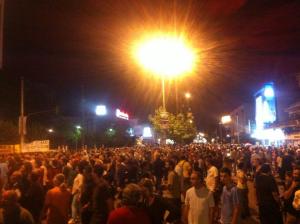Yesterday the Greek government (primarily New Democracy party, without the support of coalition partners PASOK and DIMAR) announced they would shut down ERT, Greece’s national broadcaster. The argument was that ERT is marred with corruption and that it operates at a cost to the public sector. First, ERT is profitable, as its employees testify. Second, the New Democracy spokesman Kedikoglou who announced the decision and raged about “corruption” was the same politician that has requested the hiring of 23 of “his” people in ERT!
More importantly, the decision was not approved by the parliament but was implemented through a ministerial decree (which is a violation of the Constitution and Greek legislative procedure). The decree is now at the office the President of the Hellenic Republic and parties opposing it have contacted him NOT to sign it. Neo-nazi Golden Dawn and New Democracy are the only 2 parties that have openly supported the decision (although it seems coalition partners were aware of it).
The decision was announced during the day and at 11pm riot police went to Mount Ymittos and turned off the digital and analogue signals. ERT was still broadcasting and used TVE (Spanish), and 902 channels (owned by the Communist Party), among others. A couple of hours later DIGEA (private operator of the digital signal in Greece) turned off the 902 channel, claiming it should not broadcast ERT!
ERT employs more than 2500 people and operates channels across Greece, in remote areas where other broadcasters have no signal. It also broadcasts across the world, informing Greeks living abroad and providing a live link to them with Greek culture and “home”. Protesters gathered outside the ERT building until 3 am in the morning and they are gathering again today.
ERT is the only broadcaster that actually operates legally in Greece, with all other TV channels lacking an official permit from the state.
Here in London, a demonstration has been organised to support ERT employees, at 5pm London time at the Greek Embassy W11 3TP.
This is the facebook link http://www.facebook.com/events/551233141581740/551427951562259/?notif_t=plan_mall_activity
This is the announcement by the European Federation of Journalists.
http://europe.ifj.org/en/articles/closure-of-public-broadcaster-in-greece
This is the announcement by the European Broadcasting Union.
http://www3.ebu.ch/cms/en/sites/ebu/contents/news/2013/06/ebu-urges-greek-government-to-re.html
This is the announcement of the National Union of Journalists in London.
http://www.nuj.org.uk/innerPagenuj.html?docid=2950
This is a petition to stop the shutdown of Public Television in Greece.
http://www.avaaz.org/en/petition/Stop_the_shutdown_of_Public_Television_in_Greece/?awfVmdb
Please follow #ERT on twitter to find out more.
Please write about this and support us, we have no other outlet except internet and foreign broadcasters.
This is about freedom of speech, the right to independent information and democracy itself.
Thank you in advance for your support.



